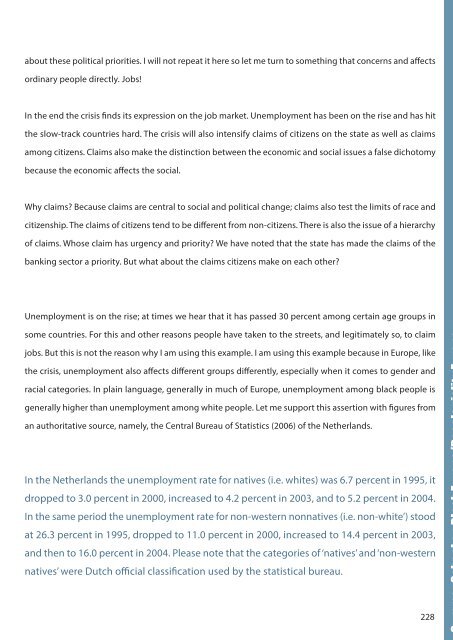cartas a @ s europe @ s cartas al europe letterstotheeuropeans
cartas a @ s europe @ s cartas al europe letterstotheeuropeans
cartas a @ s europe @ s cartas al europe letterstotheeuropeans
Create successful ePaper yourself
Turn your PDF publications into a flip-book with our unique Google optimized e-Paper software.
about these politic<strong>al</strong> priorities. I will not repeat it here so let me turn to something that concerns and affects<br />
ordinary people directly. Jobs!<br />
In the end the crisis finds its expression on the job market. Unemployment has been on the rise and has hit<br />
the slow-track countries hard. The crisis will <strong>al</strong>so intensify claims of citizens on the state as well as claims<br />
among citizens. Claims <strong>al</strong>so make the distinction between the economic and soci<strong>al</strong> issues a f<strong>al</strong>se dichotomy<br />
because the economic affects the soci<strong>al</strong>.<br />
Why claims? Because claims are centr<strong>al</strong> to soci<strong>al</strong> and politic<strong>al</strong> change; claims <strong>al</strong>so test the limits of race and<br />
citizenship. The claims of citizens tend to be different from non-citizens. There is <strong>al</strong>so the issue of a hierarchy<br />
of claims. Whose claim has urgency and priority? We have noted that the state has made the claims of the<br />
banking sector a priority. But what about the claims citizens make on each other?<br />
Unemployment is on the rise; at times we hear that it has passed 30 percent among certain age groups in<br />
some countries. For this and other reasons people have taken to the streets, and legitimately so, to claim<br />
jobs. But this is not the reason why I am using this example. I am using this example because in Europe, like<br />
the crisis, unemployment <strong>al</strong>so affects different groups differently, especi<strong>al</strong>ly when it comes to gender and<br />
raci<strong>al</strong> categories. In plain language, gener<strong>al</strong>ly in much of Europe, unemployment among black people is<br />
gener<strong>al</strong>ly higher than unemployment among white people. Let me support this assertion with figures from<br />
an authoritative source, namely, the Centr<strong>al</strong> Bureau of Statistics (2006) of the Netherlands.<br />
In the Netherlands the unemployment rate for natives (i.e. whites) was 6.7 percent in 1995, it<br />
dropped to 3.0 percent in 2000, increased to 4.2 percent in 2003, and to 5.2 percent in 2004.<br />
In the same period the unemployment rate for non-western nonnatives (i.e. non-white’) stood<br />
at 26.3 percent in 1995, dropped to 11.0 percent in 2000, increased to 14.4 percent in 2003,<br />
and then to 16.0 percent in 2004. Please note that the categories of ‘natives’ and ‘non-western<br />
natives’ were Dutch offici<strong>al</strong> classification used by the statistic<strong>al</strong> bureau.<br />
Summer School on Black Europe/Decoloni<strong>al</strong>ity Europe<br />
com estas prioridades políticas. Eu não vou repeti-lo aqui, então deixem-me voltar para <strong>al</strong>go que preocupa<br />
e afeta diretamente as pessoas comuns. Emprego!<br />
No fin<strong>al</strong>, a crise encontra sua expressão no mercado de trab<strong>al</strong>ho. O desemprego tem vindo a aumentar e atingiu<br />
com maior impacto os países que crescem mais lentamente.A crise também vai intensificar as reinvindicações<br />
dos cidadãos sobre o Estado, bem como as reinvindicações entre os cidadãos. Essas reinvindicações fazem<br />
da distinção entre as questões económicas e sociais uma f<strong>al</strong>sa dicotomia, porque a economia afeta o soci<strong>al</strong>.<br />
Porquê reinvindicações? Porque reivindicações são fundamentais para a mudança soci<strong>al</strong> e política; também<br />
testam os limites da raça e cidadania. As reivindicações dos cidadãos tendem a ser diferentes dos não-cidadãos.<br />
Há também a questão da hierarquia das reivindicações. De quem são as reinvindicações urgentes e priori-<br />
tárias? Temos notado que o Estado tem feito as reivindicações do setor bancário uma prioridade. Mas o que<br />
acontece com as reivindicações que os cidadãos fazem uns aos outros?<br />
O desemprego está a aumentar, às vezes ouvimos dizer que ele ultrapassou 30 por cento entre determinados<br />
grupos de idade em <strong>al</strong>guns países. Foi por esta e outras razões que as pessoas tomaram as ruas e, legitimam-<br />
ente reivindicaram empregos. Mas esta não é a razão pela qu<strong>al</strong> eu estou a usar este exemplo. Eu estou a usar<br />
este exemplo porque, na Europa, t<strong>al</strong> como a crise, o desemprego também afeta diferentes grupos de forma<br />
distinta, especi<strong>al</strong>mente quando se trata de categorias de género e raciais. Em linguagem simples, ger<strong>al</strong>mente,<br />
em grande parte da Europa, o desemprego entre os negros é ger<strong>al</strong>mente maior do que o desemprego entre<br />
as pessoas brancas. Deixem-me apoiar esta afirmação com números de uma fonte de autoridade, ou seja, o<br />
Gabinete/Departamento/Direcção Centr<strong>al</strong> de Estatísticas (2006) da Holanda.<br />
Na Holanda, a taxa de desemprego para os “nativos” (ou seja, os brancos) foi de 6,7 por cento<br />
em 1995 e caiu para 3,0 por cento em 2000, aumentou para 4,2 por cento em 2003 e para 5,2<br />
por cento em 2004. No mesmo período, a taxa de desemprego para não-nativos não-ocidentais<br />
(ou seja, não-brancos ‘) situou-se em 26,3 por cento em 1995, caiu para 11,0 por cento em<br />
2000, aumentou para 14,4 por cento em 2003, e depois para 16,0 por cento em 2004. Por<br />
favor, notem que as categorias “nacionais” e “nacionais não-ocidentais”foram utilizadas pelo<br />
departamento de estatística como classificações oficiais Holandesas<br />
228 229


